In every stage of life, from pursuing higher education to exploring professional opportunities, we may find ourselves in a situation where we are asked to advocate for someone we know well. There is an art to crafting a persuasive and sincere letter of recommendation, especially for a friend.
This unique form of endorsement requires a delicate balance of personal anecdotes and professional attributes. In this article, we will provide essential insights, useful templates, and practical tips to guide you in writing a compelling letter of recommendation for a friend, ensuring you can convincingly vouch for their character, skills, and potential in a professional context.
Table of Contents
What is a letter of recommendation for a friend?

A letter of recommendation for a friend, often referred to as a personal or character reference, is a document written by an individual who knows the friend well outside of a professional work setting and can attest to their personal qualities and character traits.
It is typically used in contexts where personal characteristics and attributes are important, such as when applying for a scholarship, volunteer work, certain job roles, or even housing arrangements. Unlike a professional letter of recommendation, it focuses more on personal attributes, behaviors, and the writer’s firsthand experiences with the friend, providing a holistic view of the person’s potential beyond just academic or professional qualifications.
Letter of Recommendation For A Friend Templates
Letter of Recommendation for a Friend templates are preformatted documents created to guide individuals in vouching for a friend’s character, abilities, or accomplishments. These templates are tailored to present personal insights and attestations in a professional manner.
Available in formats such as Word documents or PDFs, these templates typically include sections for the recommender’s details, relationship duration, and specifics about the friend’s qualities, experiences, or achievements. They are instrumental when a friend is applying for jobs, educational opportunities, or community positions.
These templates focus on personal attributes such as trustworthiness, reliability, and dedication, allowing the writer to elaborate with anecdotes or instances that exemplify these traits. They also provide guidance on format and tone, ensuring the letter feels genuine yet professional.
What to include in a personal letter of recommendation?
Writing a personal letter of recommendation can be a thoughtful and fulfilling task. You are helping someone advance their career or education by providing positive, detailed feedback about their abilities, skills, and character traits. Here’s a guide on what to include in a personal letter of recommendation:
Salutation: Start your letter with a professional greeting. If you know the recipient’s name, use it. If not, use a general salutation such as “To Whom It May Concern.”
Introduction: In the first paragraph, introduce yourself, your professional position, and your relationship to the person you’re recommending. Explain how long you’ve known them and in what capacity.
Overview of Qualities and Accomplishments: In the body of the letter, discuss the person’s qualities, skills, and accomplishments that make them a good fit for the position or institution. This could include technical skills, soft skills, or character traits. Be as specific as possible and use examples to illustrate your points.
Specific Examples: Provide one or more specific examples of the person demonstrating the qualities or skills you’re highlighting. The more specific and detailed, the more convincing your recommendation will be. These could be projects they completed, challenging situations they handled, or other notable accomplishments.
Comparison to Peers: If possible, compare the person to others you have known in a similar position. This gives the recipient a benchmark to understand how exceptional the candidate is.
Fit for Position/Institution: Discuss why you believe the person would be a good fit for the specific position, program, or institution. This will show that you’ve given careful thought to your recommendation.
Endorsement and Confidence: Clearly state that you recommend the person and that you have confidence in their abilities. Be enthusiastic, but make sure your praise is believable and not over the top.
Conclusion: In the closing paragraph, offer to provide further information if necessary. Include your contact information here.
Signature: End with a closing like “Sincerely” or “Best regards,” followed by your name and title.
When should you write to letter of recommendation ?
A letter of recommendation is typically written when your friend is applying for a job, an academic program, a scholarship, or a special opportunity that requires a reference. Here are a few instances when you might be asked to write a recommendation letter:
Job Applications
If your friend is applying for a new job and you have professional knowledge of their abilities, they might ask you for a recommendation letter. This is especially likely if you have worked with them before, either as a coworker or a manager.
College/Graduate School Admissions
If your friend is applying for an academic program, particularly at the graduate level, they might need recommendation letters. If you were classmates or if you’ve worked on academic projects together, you could be a good candidate to write a letter.
Scholarship Applications
Many scholarships require applicants to submit recommendation letters. If you know your friend’s academic or professional abilities well, you might be asked to write a letter.
Housing Applications
Sometimes, rental applications require references or recommendation letters. If you’ve lived with this friend before or know them well, you could be asked to write a letter attesting to their reliability and character.
Volunteer/Community Service Applications
If your friend is applying to a volunteer position or community service opportunity, they might need a recommendation letter.
Professional Awards or Recognitions
If your friend is being considered for a professional award or recognition, you might be asked to write a letter supporting their nomination.
How to Write Recommendation Letter for your Friend ?
Writing a recommendation letter for a friend can be a great way to help them advance in their career, education, or other endeavors. However, it can also be challenging to write objectively about someone you’re close to personally. Here’s a step-by-step guide to help you:
Understand the Context
Ask your friend about the context in which the recommendation letter will be used. If it’s for a job, understand the job description and the key skills required. If it’s for a school application, understand the course of study and the school’s values. Your friend should provide you with all the necessary information.
Start with a Professional Format
Like any professional letter, start with your contact information at the top, followed by the date, and then the contact information of the recipient (if known).
Salutation: Use a formal greeting
If you know the recipient’s name, use it. If not, “To Whom It May Concern” is appropriate.
Introduction
The first paragraph should mention your relationship with the person you’re recommending. Describe how you know each other, for how long, and in what capacity.
State Your Qualifications
If relevant, explain why you’re qualified to provide a recommendation. For example, if you’re recommending your friend for a job and you’ve worked in the same industry, mention this.
Character Reference
Write about your friend’s character traits that are relevant to the position or opportunity they’re seeking. You might talk about their reliability, creativity, teamwork, leadership, or other qualities. Provide examples of when they’ve demonstrated these traits.
Skills and Accomplishments
Mention specific skills your friend has and how they have used these skills in the past. Try to give clear examples of when your friend has achieved something noteworthy, whether it’s in a professional, academic, or personal setting.
Comparisons
If possible, compare your friend to others you’ve known in a similar capacity. This can help to highlight your friend’s exceptional qualities.
Recommendation
State clearly that you recommend your friend for the position or opportunity. Be as specific as possible about why you think they’re a good fit.
Closing Remarks
Towards the end, offer to provide further information if required, and provide your contact details.
Signature
End with a professional closing such as “Sincerely” or “Best regards,” then sign your name. If it’s an electronic document, typing your full name will suffice.
Proofread
Make sure to review your letter for any grammatical or spelling mistakes. Even small errors can distract from the message you’re trying to convey.
Tips to write an effective letter of recommendation for a friend
Writing a recommendation letter for a friend can be a great help to them, but it’s important to do it effectively. Here are some tips and a detailed guide to help you write an effective recommendation letter:
Understand the Purpose: First, you should understand the purpose of the letter. What opportunity is your friend applying for? What are the key requirements or desirable attributes for this opportunity? The letter should be tailored to the specifics of the opportunity.
Personal and Professional Balance: While it’s a friend you’re recommending, it’s important to maintain a professional tone. However, because of your personal relationship, you also have a unique perspective on their character, which you can incorporate.
Include Specifics: Be specific about your friend’s skills and achievements. Don’t just say that your friend is “hardworking.” Provide specific examples that demonstrate this quality. The more concrete details you can provide, the more effective your letter will be.
Highlight Relevant Skills: Highlight the skills that are most relevant to the opportunity your friend is seeking. Make sure to link these skills to specific experiences or examples.
Keep It Positive: While it’s important to be honest, try to keep your letter as positive as possible. If there are areas where your friend has room for improvement, focus on their willingness to learn and adapt, rather than on their weaknesses.
Use a Formal Tone: Use a formal and respectful tone throughout your letter. Even though you’re writing for a friend, the letter is for a professional or formal purpose.
Avoid Exaggeration: It’s important to be honest and not exaggerate your friend’s skills or accomplishments. Inflated praise can come off as insincere and may harm your friend’s chances.
Offer to Provide Further Information: At the end of the letter, indicate that you’re willing to provide further information if needed. This shows that you stand by your recommendation and are willing to support it.
Proofread Your Letter: Always proofread your letter to ensure that it’s free of typos and grammatical errors. You want your friend to make the best possible impression.
Close with a Strong Endorsement: Summarize why you believe your friend is a good fit for the opportunity and why you’re confident they will succeed. This reaffirms the points you’ve made in the body of the letter.
Example letter of recommendation for a friend
[Your Name]
[Your Address]
[City, State, ZIP]
[Your Email Address]
[Your Phone Number]
[Date]
[Recipient’s Name or “To Whom It May Concern”]
[Recipient’s Position]
[Recipient’s Organization]
[Recipient’s Address]
[City, State, ZIP]
Dear [Recipient’s Name or “To Whom It May Concern”],
I am writing to highly recommend my friend, [Friend’s Name], for the [Job/Position/Scholarship/Program] at your esteemed [Company/University/Organization]. I have had the pleasure of knowing [Friend’s Name] for over [number of years or time period] and have found him/her to be an exceptional individual who is dedicated, reliable, and passionate about [the relevant field or activity].
During our time together at [College/University/Company/Community], I had numerous opportunities to witness [Friend’s Name]’s exceptional skills and potential. He/She is not only intelligent and innovative but also has a strong sense of responsibility and commitment to everything he/she undertakes.
For example, while working together on a community project, [Friend’s Name] demonstrated extraordinary leadership and organizational skills. He/She coordinated a team of [number of team members], effectively delegating tasks, and ensuring that everyone was able to contribute their skills effectively. The project was a resounding success, significantly improving [mention the positive impact the project had], and [Friend’s Name] was largely to thank for that.
[His/Her] work ethic is second to none. [He/She] is the first one in the office and the last one to leave, often sacrificing personal time to ensure the job gets done. In terms of skills, [he/she] is proficient in [mention specific technical skills] and has a knack for problem-solving that has proven invaluable on more than one occasion.
Compared to others I have worked with in similar capacities, [Friend’s Name] stands out for [his/her] dedication, perseverance, and genuine enthusiasm for [his/her] work. I have no doubt that [he/she] would bring these same qualities to your [Company/University/Organization].
I wholeheartedly recommend [Friend’s Name] for the [Job/Position/Scholarship/Program] and am confident that [he/she] will exceed your expectations and make a significant contribution to your [Company/University/Organization].
Please feel free to contact me at [Your Email Address] or [Your Phone Number] if you require any further information.
Sincerely,
[Your Name]
[Your Position/Title, if applicable]
FAQs
Who should write a letter of recommendation for a friend?
Ideally, a letter of recommendation should be written by someone who has a professional or academic relationship with the friend. It could be a former employer, coworker, professor, mentor, or any other person who can speak to the friend’s qualifications and personal qualities.
How should a letter of recommendation for a friend be formatted?
A letter of recommendation should generally follow a professional format. It should be typed and printed on a professional letterhead if available. Use a standard font and font size (such as Times New Roman, 12-point), and maintain proper spacing and margins. Address the letter to the appropriate recipient and use a formal tone throughout.
Can I provide negative feedback in a letter of recommendation for a friend?
It is generally recommended to focus on the friend’s positive qualities and avoid providing negative feedback in a letter of recommendation. If you don’t feel comfortable writing a positive recommendation, it is best to decline the request or suggest that your friend seeks a recommendation from someone who can provide a more favorable perspective.
Should I include my contact information in the letter of recommendation?
Yes, it is important to include your contact information in the letter of recommendation. This allows the recipient to reach out to you if they have any further questions or need additional information. Include your full name, phone number, email address, and any other relevant contact details.
How long should a letter of recommendation for a friend be?
A letter of recommendation for a friend should typically be concise and focused. It is recommended to keep it to one or two pages, making sure to include all the necessary information without excessive length. Aim for a clear and well-structured letter that effectively highlights your friend’s qualifications and qualities.
Can I see a sample letter of recommendation for a friend?
While I cannot provide a specific sample letter, there are many templates and examples available online that can guide you in writing a letter of recommendation for a friend. These resources can help you understand the structure, tone, and content to include in your letter. Just search for “sample letter of recommendation for a friend” to find some useful references.
How should I address the recipient of the letter of recommendation?
It’s important to address the recipient appropriately in the letter. If you know the specific person’s name, use their full name along with their professional title (e.g., Dr. Jane Smith). If you don’t have the recipient’s name, you can use a general salutation such as “To Whom It May Concern” or “Dear Hiring Manager.”
Can I write a letter of recommendation for a friend if I am their family member?
While it is possible to write a letter of recommendation for a friend who is a family member, it is generally recommended to choose a non-family member who can provide a more unbiased perspective. Family relationships may be seen as having a potential conflict of interest, and the letter may be perceived as less objective.
How do I maintain a professional tone in the letter?
To maintain a professional tone in the letter, avoid using overly casual language or colloquialisms. Use formal language, proper grammar, and correct punctuation. Stay focused on the friend’s qualifications and avoid irrelevant personal details. It’s also essential to proofread the letter for any errors before submitting it.
Should I include specific examples or anecdotes in the letter?
Including specific examples or anecdotes can strengthen your letter of recommendation. Sharing instances where your friend demonstrated their skills or positive qualities can provide concrete evidence of their abilities. These examples can make your letter more compelling and memorable to the reader.
Is it necessary to mention any weaknesses or areas for improvement?
It is not necessary to mention weaknesses or areas for improvement in a letter of recommendation, especially if they are not directly relevant to the opportunity your friend is applying for. Focus on highlighting their strengths and positive attributes instead. However, if there are specific weaknesses that you believe are important to address, you can mention them briefly but also provide constructive suggestions for improvement.
Can I send the letter directly to my friend instead of the recipient?
Generally, it is preferable to send the letter directly to the recipient rather than giving it to your friend to submit. This ensures that the recommendation is treated as confidential and maintains the professionalism of the process. However, it’s always a good idea to communicate with your friend and confirm their preferred method of submitting the letter.
Can I provide multiple letters of recommendation for my friend?
While providing multiple letters of recommendation can offer a broader perspective on your friend’s qualifications, it’s generally more effective to have one or two strong letters from reliable sources rather than multiple mediocre ones. Quality and relevance are more important than quantity. Consider choosing individuals who can provide unique insights into different aspects of your friend’s abilities and character.
How far in advance should I request a letter of recommendation from a friend?
It is considerate to give your friend ample time to write the letter, so it’s best to request it well in advance. Ideally, provide them with at least a few weeks’ notice, especially if the opportunity has a deadline or requires additional materials. This allows your friend enough time to craft a thoughtful and well-written recommendation.


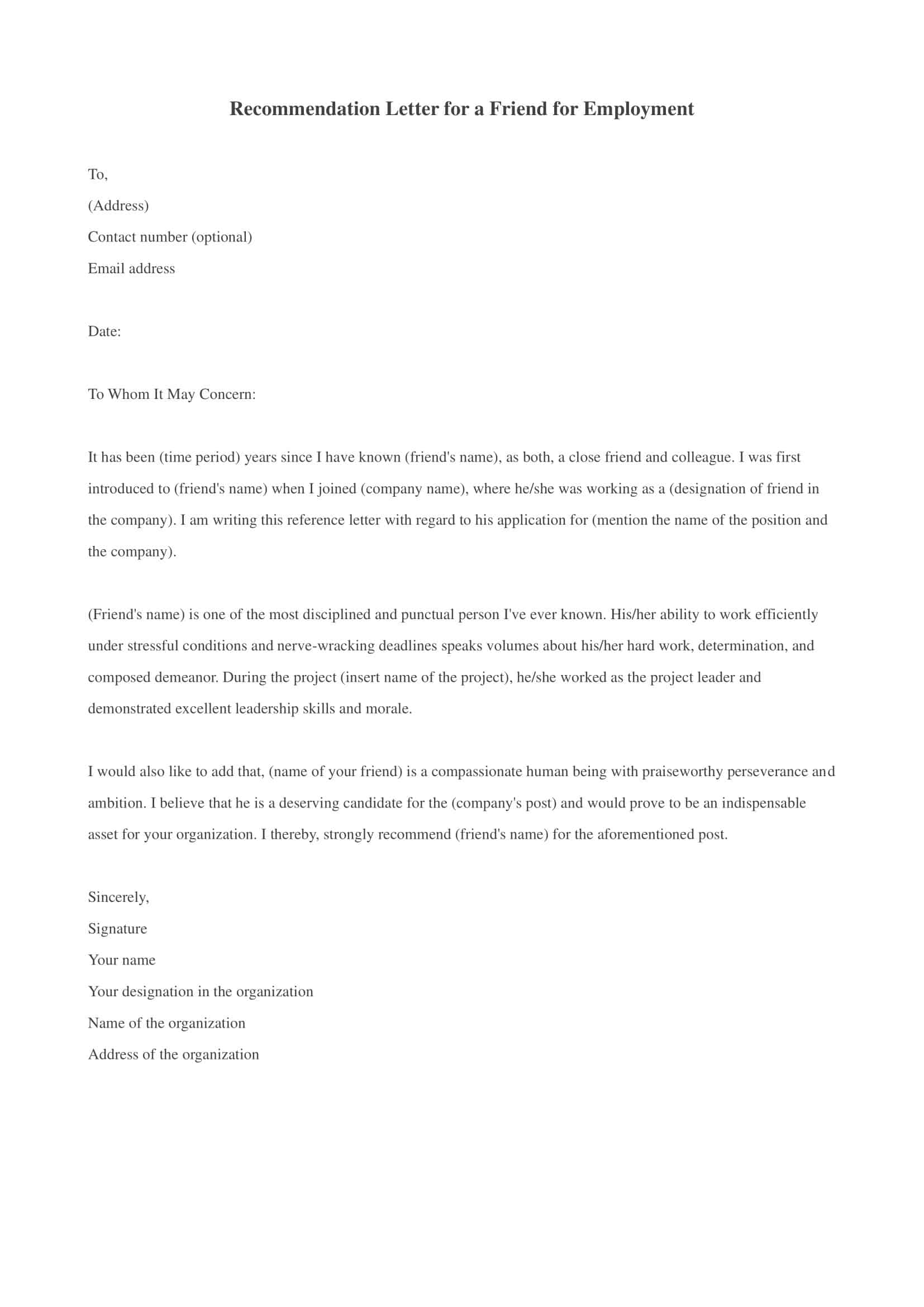








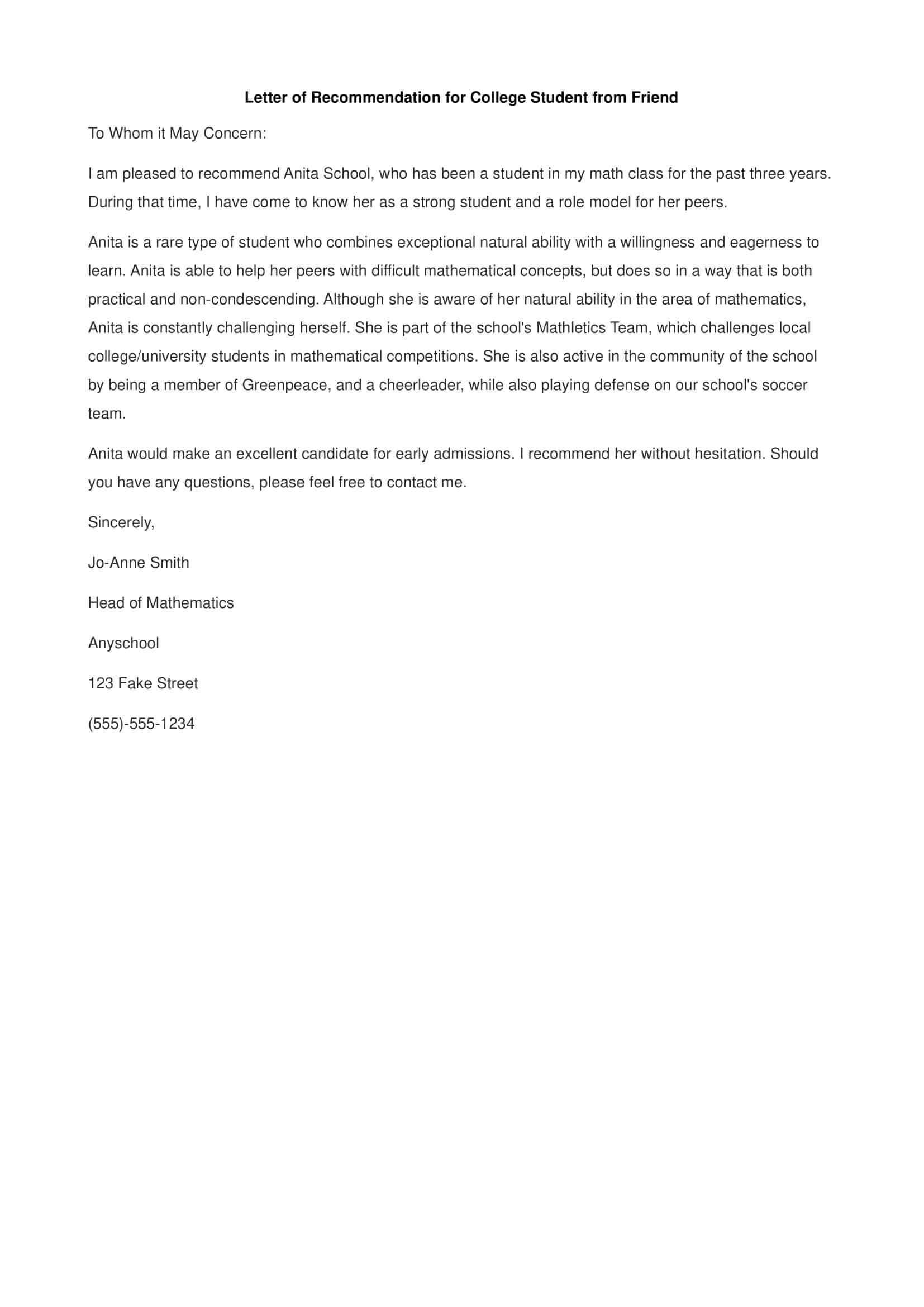
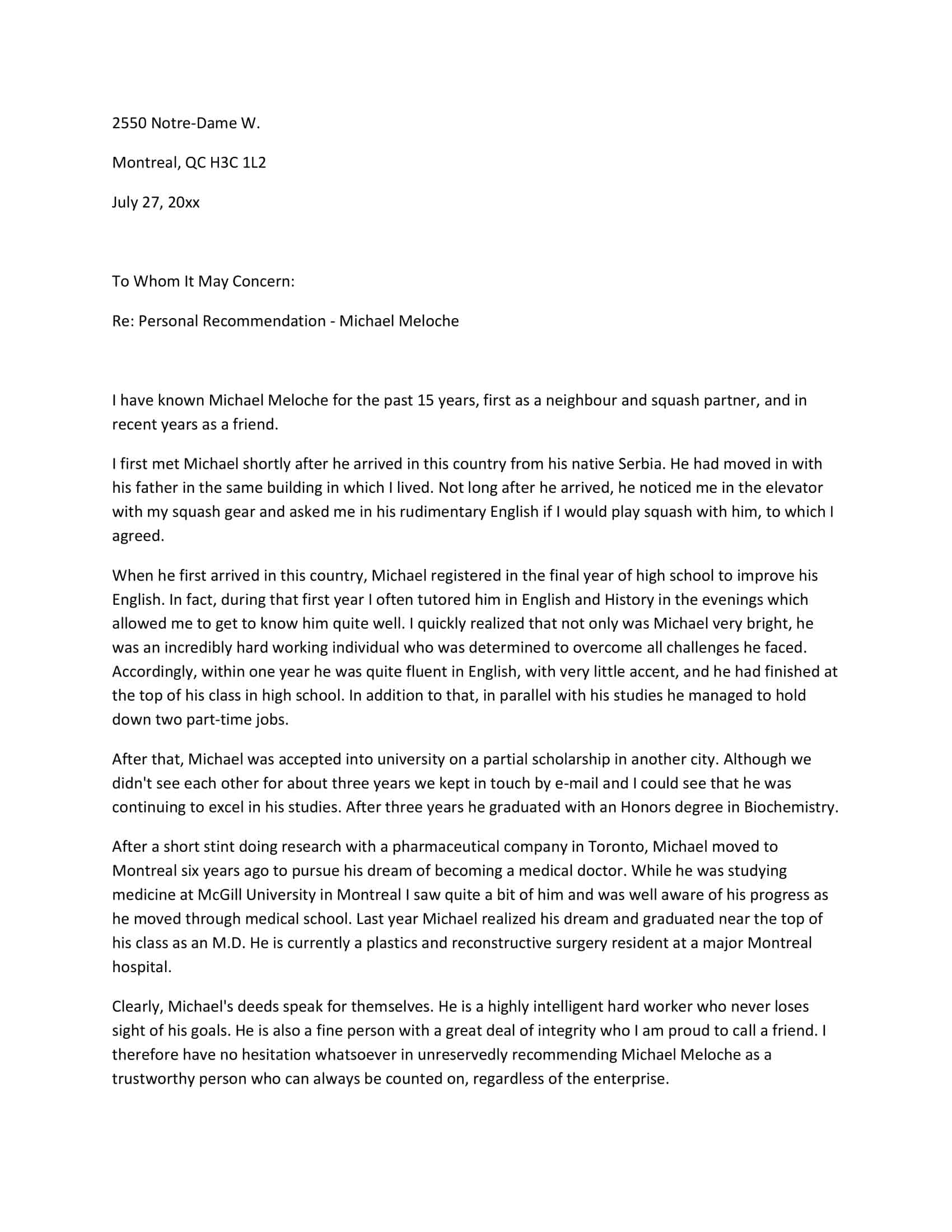









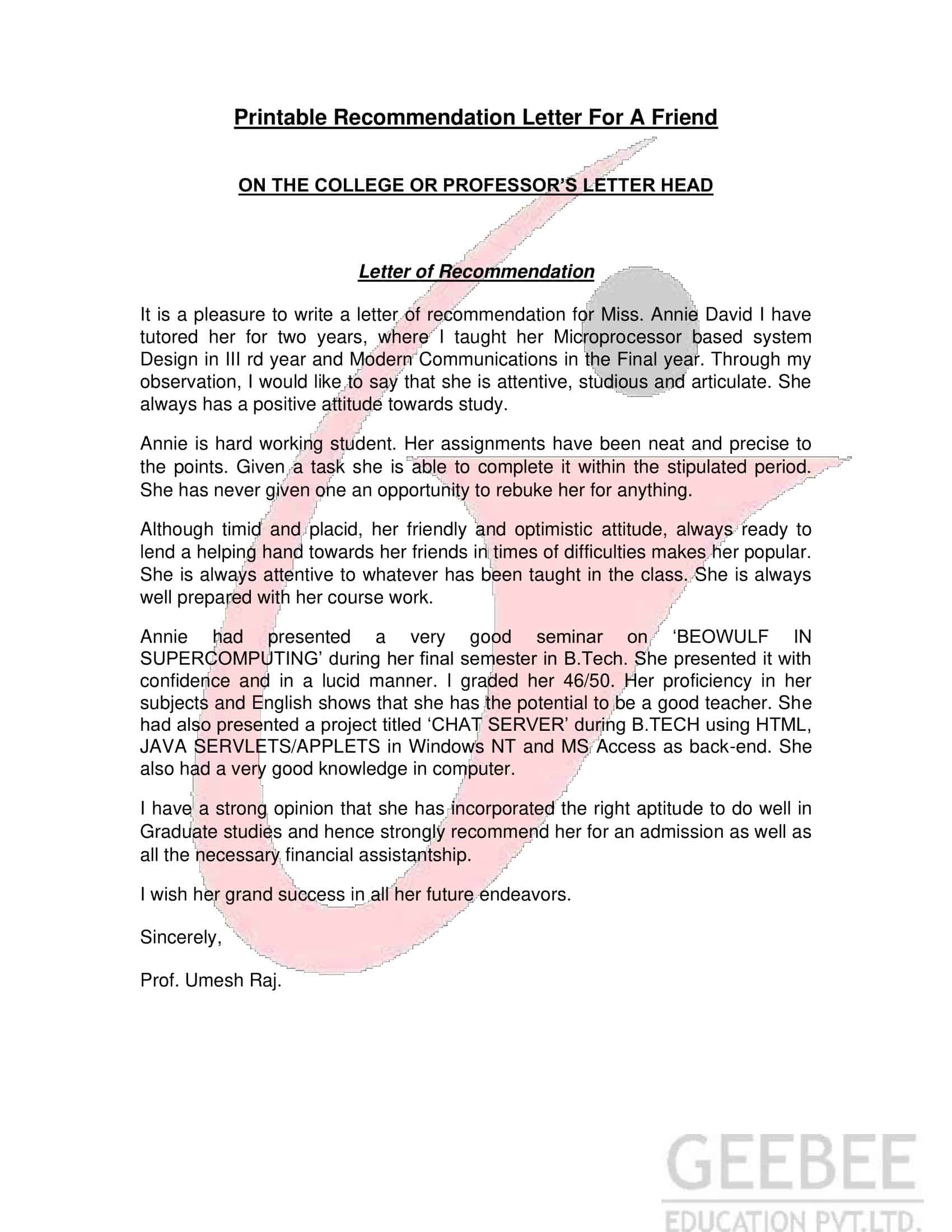

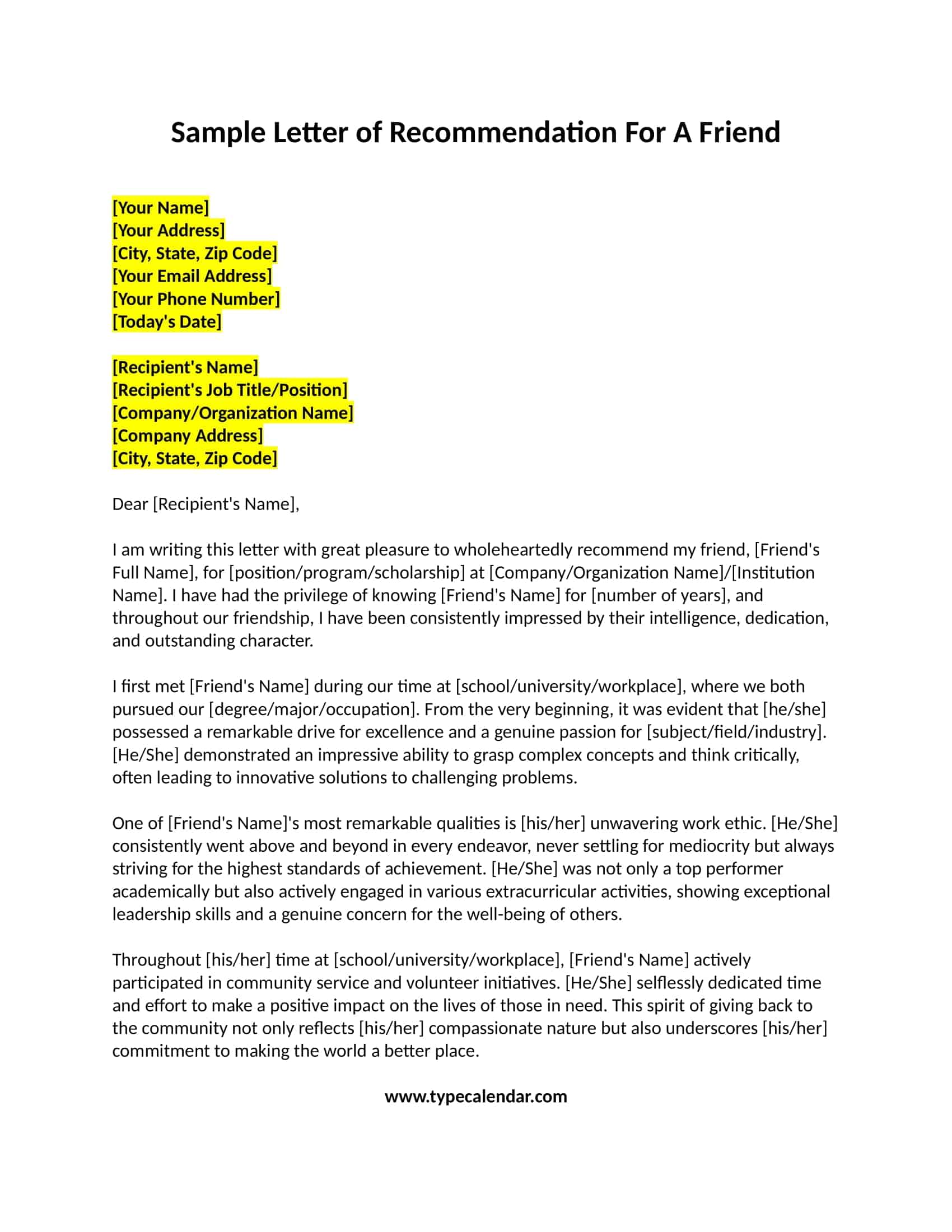



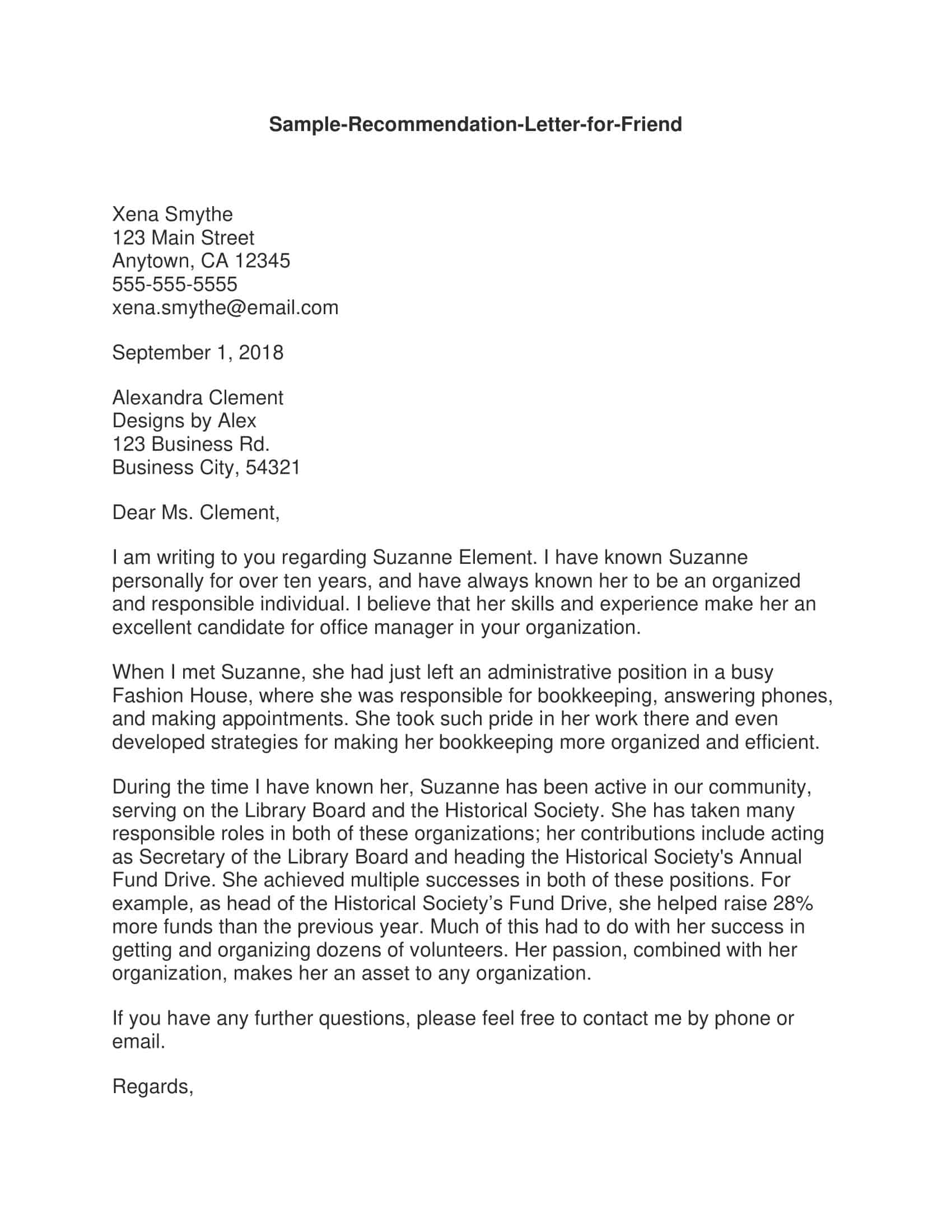
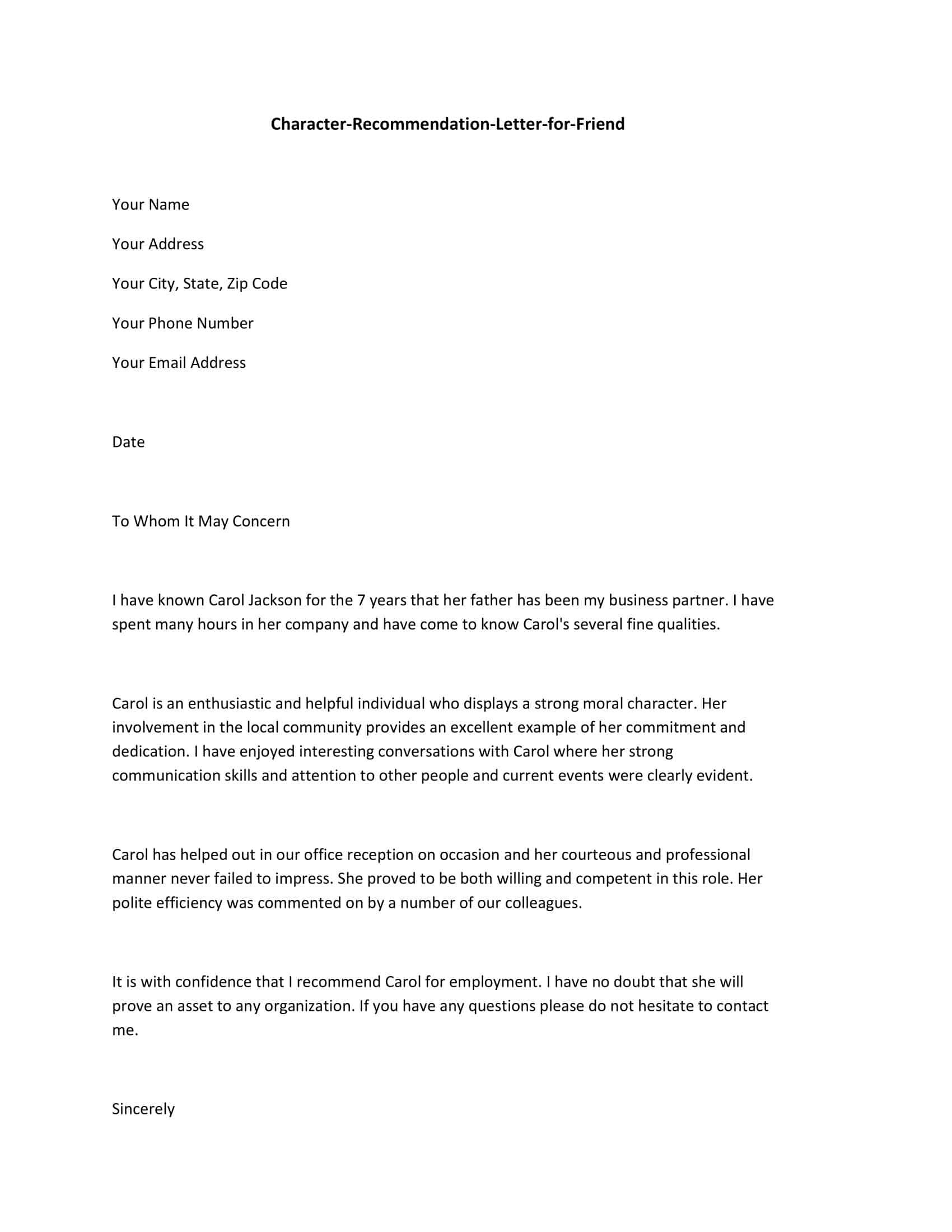
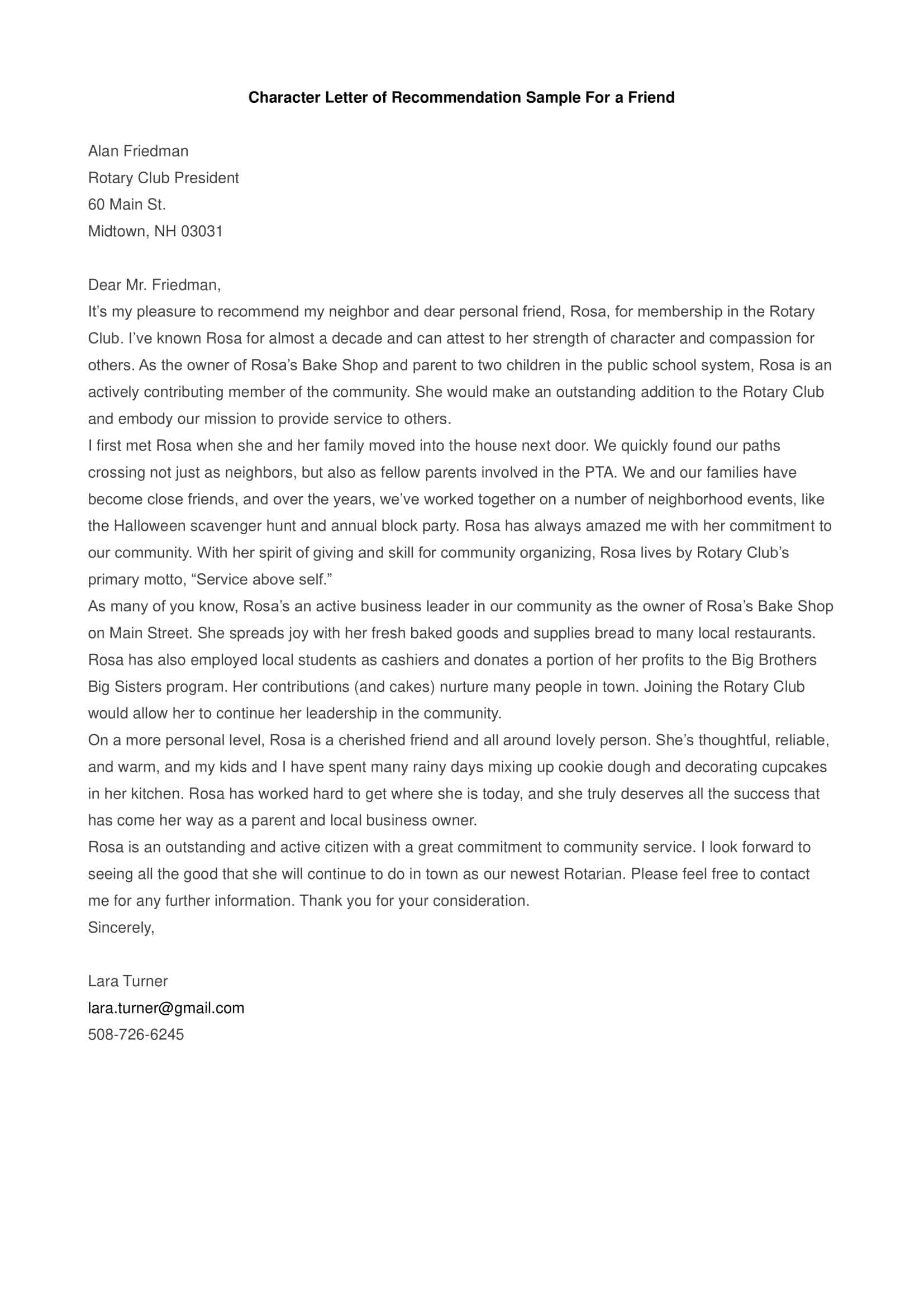

![Free Printable Friendly Letter Templates [PDF, Word, Excel] 1st, 2nd, 4th Grade 1 Friendly Letter](https://www.typecalendar.com/wp-content/uploads/2023/05/Friendly-Letter-150x150.jpg 150w, https://www.typecalendar.com/wp-content/uploads/2023/05/Friendly-Letter-1200x1200.jpg 1200w)
![43+ Printable Leave of Absence Letter (LOA) Templates [PDF, Word] / Free 2 Leave of Absence Letter](https://www.typecalendar.com/wp-content/uploads/2023/01/Leave-of-Absence-Letter-150x150.jpg 150w, https://www.typecalendar.com/wp-content/uploads/2023/01/Leave-of-Absence-Letter-1200x1200.jpg 1200w)
![Free Printable Congratulation Letter Templates [PDF, Word] Examples 3 Congratulation Letter](https://www.typecalendar.com/wp-content/uploads/2023/05/Congratulation-Letter-150x150.jpg 150w, https://www.typecalendar.com/wp-content/uploads/2023/05/Congratulation-Letter-1200x1200.jpg 1200w)
